April 15, 2025 | 08:49 GMT +7
April 15, 2025 | 08:49 GMT +7
Hotline: 0913.378.918
April 15, 2025 | 08:49 GMT +7
Hotline: 0913.378.918
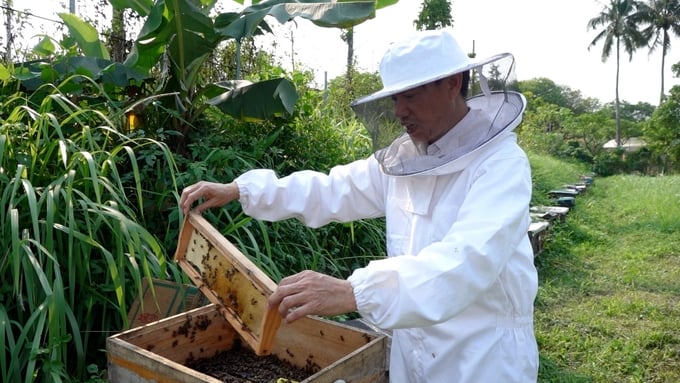
The project "Sustainable development of the bee industry until 2030" focuses on sustainable development, improving the competitiveness of the bee industry, building and protecting the brand of Vietnamese bee products. Photo: Nguyen Thuy.
Beekeeping 4.0 technology is a step forward for the beekeeping business in aligning with the current trend of smart agriculture. As Vietnam's leading bee breeding and export agency, the Research Center for Tropical Bees and Beekeeping at Vietnam National University of Agriculture is currently developing bee colony management and traceability applications, which will contribute to research efficiency, proactive bee breeding, and product quality.
The project "Sustainable Development of the Beekeeping Industry by 2030" intends to prioritize sustainable development, increase the competitiveness of the beekeeping sector, and establish and defend the Vietnamese bee product brand. Bee products are mostly produced by professional beekeeping facilities, which provide biological safety, disease safety, source traceability, environmental friendliness, and compliance with quality and food safety standards for local consumption and export.
According to Assoc. Prof. Pham Hong Thai, Director of the Tropical Bee Research and Beekeeping Center, the use of modern technologies such as IoT, AI, Blockchain... to ensure product quality, transparency in the manufacturing process, and product distribution to the market is a step forward in the industry's sustainable solutions.
With technological advancements, QR codes on product packaging labels may give customers with information such as the company location, batch number, product name, etc. Mr. Thai went on to say that using 4.0 technology to build four apps for the Tropical Bee Research and Beekeeping Center project may assist beekeepers throughout the production process, from breeding, care/nutrition, and source traceability.
"We must utilize technology to ensure transparency throughout the production process, from input to output, from processing, packaging, logistics to product distribution to wholesalers and consumers," he said.
Based on product transparency requirements, the Center's project also focuses on developing four production-related applications: seed selection, care and nurturing, purchasing, and processing, with the latter providing QR codes for source traceability (which can be considered a separate application).
Mr. Thai noted that the use of technology may assist standardize procedures beginning with seed selection. For example, selecting HVN queen bee strains from the Vietnam Academy of Agricultural Sciences, which have excellent honey yield and disease resistance, allows beekeepers to use less pesticides for disease control and other measures.
Thus, using a mobile phone to scan the QR code on the product, buyers may learn about the whole manufacturing chain, including the queen bee's exact location and the honey extraction procedure... This information chain is uploaded to the cloud and made public.
According to Nguyen Thi Lan Anh, a researcher at the Tropical Bee Research and Beekeeping Center, the use of applications not only helps to transparentize products to consumers, but also brings many benefits and efficiencies to beekeepers, assisting in changing the way bee colonies are monitored and managed from "ledger" to "digital".
Mr. Thai said that the apps produced by the Tropical Bee Research and Beekeeping Center are now being completed and tested.
Mr. Tong Xuan Chinh, Deputy Director of the Livestock Department (Ministry of Agriculture and Rural Development), said that using 4.0 technology to the beekeeping business is fundamentally beneficial and practical in Vietnam.
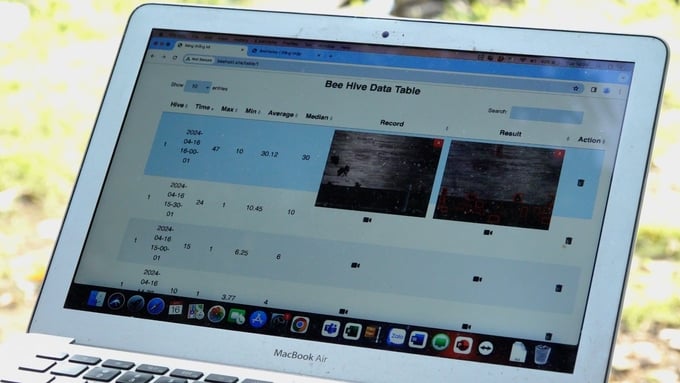
The application developed by the Research Center for Tropical Bee and Beekeeping can be monitored on phones and computers. Photo: Nguyen Thuy.
Because the beekeeping industry urgently requires export services and transparency in the domestic consumer market, the government and the Ministry of Agriculture and Rural Development prioritize the use of technology in various sectors of the industry, including beekeeping.
Furthermore, several importing nations need Vietnamese honey to meet these standards. Meanwhile, technical options for application are readily accessible.
However, adopting 4.0 technology to the beekeeping sector presents some minor hurdles and challenges, since small-scale beekeeping families and firms incur expenditures in terms of human resources and money for technology implementation. The target animal is honey bees, which are flying insects that are difficult to manage; beekeeping facilities are not set and migrate according to bloom availability.
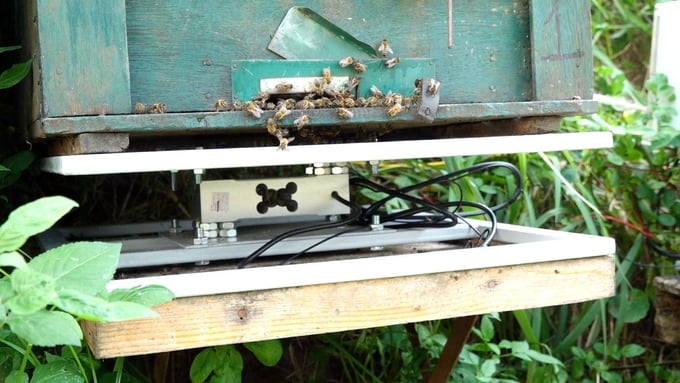
The device is installed under the bee box for monitoring and management. Photo: Nguyen Thuy.
Mr. Chinh thinks that implementing practicable solutions using 4.0 technology in the practical beekeeping business necessitates collaboration, sharing, and coordination between the corporate sector and academic, educational, and research organizations. In this collaboration, the private sector takes the lead and pays for the outcomes, while the other side works to achieve results that satisfy the needs of private sector businesses and people. However, in order to create findings that are globally acknowledged commercially, researchers must access technology, methodologies, and execute them in accordance with defined standards.
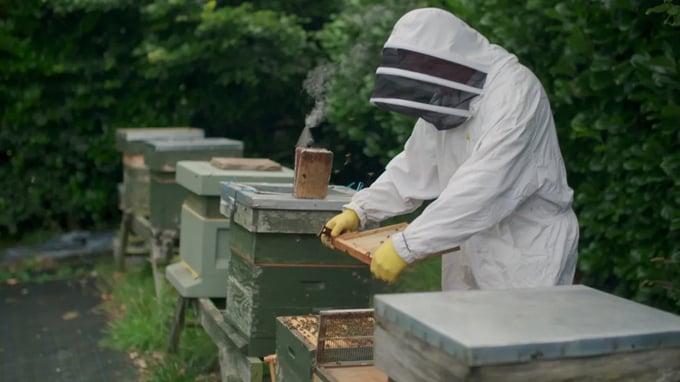
The beekeeper is using sensors from ApisProtect Company in the process of monitoring bee colonies.
Climate change, monoculture, and the use of chemicals in agriculture are all harming bee populations throughout the world. Recent data suggests that beekeepers in the United States lost over 48% of their bee colonies between 2022 and 2023.
With the present bee population scarcity, ApisProtect, an Irish firm, has created a system of warning sensors that will alert beekeepers if problems are identified in their beehives. These internet-connected sensors are put beneath the beehive's ceiling and detect temperature, humidity, sound, and movement. Data acquired from the sensors is forwarded to ApisProtect's headquarters in Cork, Ireland, for examination and processing before being sent to beekeepers.
Fiona Edwards Murphy, Co-Founder and CEO of ApisProtect, indicated that the use of these devices would allow beekeepers to maintain a huge number of beehives with the same amount of manpower and financial resources for feeding and breeding procedures. They can considerably boost pollination and honey output during operations."
Since acquiring USD1.8 million in funding from foreign investors in 2018, ApisProtect has worked with 20 beekeepers from the United States, Ireland, the United Kingdom, and South Africa to monitor the actions of millions of bees.
ApisProtect is creating a worldwide database of bee health using data from 400 smart sensors and data analysis tools to help research.
Furthermore, as the need for bees in the pollination sector grows, new technologies are being developed by firms such as Pollenity (Bulgaria), Arnia (UK), and BeeHero (Israel). Pollenity, for example, has collected $1.2 million and is working on the HIVEOPOLIS research project, which aims to enhance bee welfare via hive improvements and the use of contemporary technologies.
Sergey Petrov, Founder of Pollenity, stated: "Our technology not only redirects bee colonies to pollination sites, but it also helps bees avoid hazards such as pesticides. This is an important step in ensuring the survival of bees."
In China, certain places with honey as a pillar sector have also used digital beekeeping technology, enabling beekeepers to self-communicate queen bees, considerably enhancing honey output and bee survival. Beekeepers may remotely monitor and manage bee colonies using digital programs on their mobile phones.
Translated by Linh Linh

(VAN) The CGIAR’s Sustainable Animal and Aquatic Foods (SAAF) program represents a new approach that emphasizes the transformation of food systems toward sustainability.
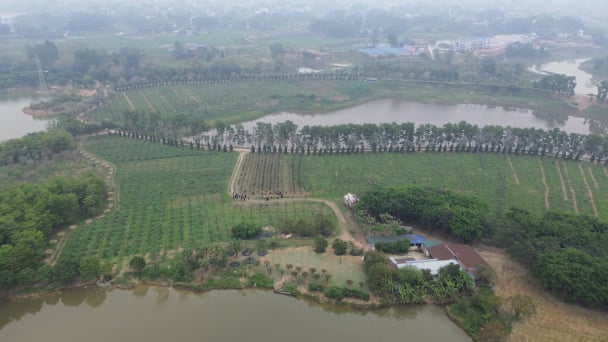
(VAN) Scientists assume that industrial agriculture has been 'outdated.' As a result, a comprehensive overhaul or a revolution in the direction of embracing ecological agriculture is needed.
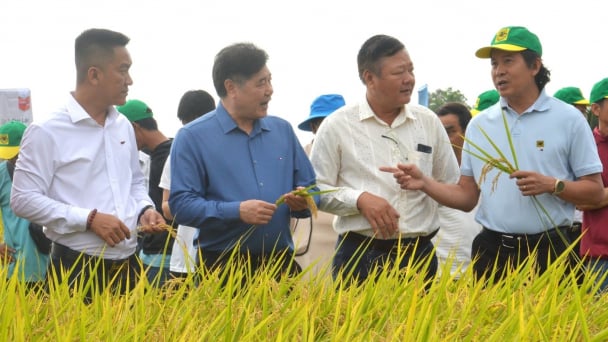
(VAN) The results from pilot fields are catalyzing the expansion of the One million hectares of high-quality, low-emission rice project in Kien Giang.
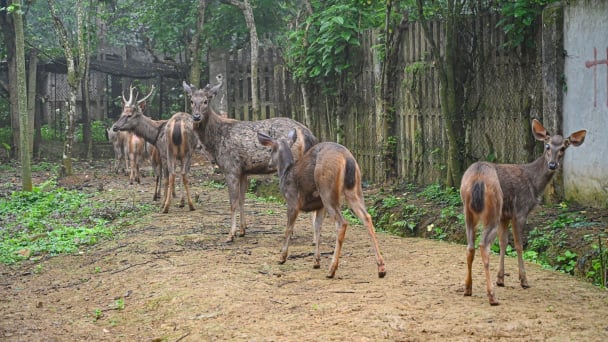
(VAN) On the morning of April 11, Cuc Phuong National Park received 18 individuals of endangered and rare wild animals from Da Nang city.

(VAN) FAO supports Vietnam in enhancing survey sampling techniques for the 2025 nationwide agricultural and rural census.

(VAN) By participating in the green transition, manufacturers become an indispensable part of the circular economy, contributing to resource optimization and environmental protection.
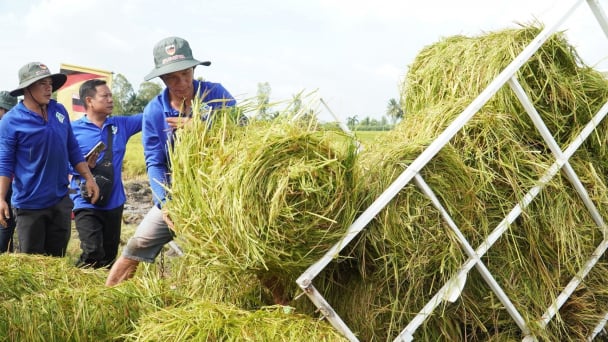
(VAN) The One Million Hectares of High-Quality and Low-Emission Rice Program can generate nearly 14 million tons of straw annually, posing an urgent requirement to diversify straw-based products.